California State University, Dominguez Hills’ graduating class of 2014 is remarkable. From future business leaders, scientific researchers, artists and academics, the close to 3,000 degree candidates join the Toro family network to succeed and lead their communities. These are just some of the students who will become the next generation of experts and leaders.
Kumar Tiger, 23, B.S., molecular and cellular biology
Future scientist Kumar Tiger was heavily involved in campus life at CSUDH, participating in the Louis Stokes Alliance for Minority Participation (LSAMP) and the Minority Biomedical Research Support program (MBRS-RISE).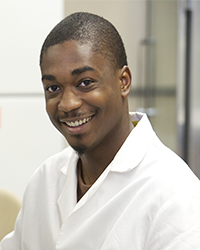
In addition, he was the treasurer of the Pre-Health Society and the president of the Phi Sigma Biological Sciences Honor Society. He also participated in the Leadership Alliance at Brown University and a summer research experience at Rutgers University.
“I valued the ability to pursue my dreams of becoming a scientist and a leader,” said Tiger. “Here at CSUDH you are recognized as an individual who is capable of doing anything as long as you push yourself to obtain the objective. Everyone conspires to help you achieve your goals.”
After graduation, he will be attending CSU Los Angeles for an M.S. in biology before he pursues a Ph.D. Tiger was selected for the Bridges to Doctorate program in which he will be a graduate student working at both UCLA and CSULA as a researcher studying muscle development.
John Gibson IV, 27, B.A., psychology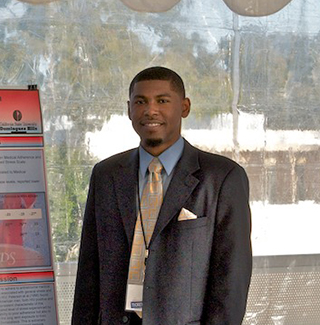
John Gibson knows that you get what you put into your university experience, and he’s made sure to grab every opportunity while here. He’s not only a part of the MBRS-RISE science research program, but was also funded to conduct research in the neuropsychology lab, which led to an award at the CSUDH Student Research Day in 2011.
That recognition eventually led him to present research in Washington D.C. at the American Psychological Association conference in 2012 and in Hawaii at the International Society for Neuropsychology conference in 2013. There is one opportunity that stands out, however. Gibson says a summer internship for NASA was the highlight of his academic career, adding that is was his “greatest achievement.”
After graduation, he will be pursuing an M.S. in human factors and applied cognition at George Mason University. His goal is to develop safer and less cumbersome ways of interacting with transportation.
“The future is full of challenges like global gridlock, fuel crisis, and increased air traffic congestion, so I want to help combat that,” said Gibson.
Jessica Mendoza, 23, B.A., psychology 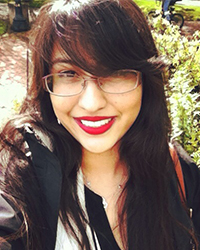
Jessica Mendoza is a McNair Scholar, an initiative dedicated to preparing first generation students who come from underrepresented backgrounds for a doctoral program.
“Being the first in the family to attend college was definitely a challenge,” said Mendoza. “I come from a working class Latino family; my dad is a construction foreman and has worked for a physically demanding job for over twenty years.”
She adds that because of this, he always pushed her to strive for more.
“He wanted me to be educated and pursue a career that is mentally fulfilling,” she said.
That’s exactly why she decided to pursue a degree in psychology at CSUDH and became very involved with the psychology club on campus. She was the secretary of both the club and the Psi Chi Honor Society. This year, she also co-chaired CSUDH’s ninth annual Student Research Day, which showcases the work students are doing across campus to the larger community. In addition to these activities, she also worked as a research assistant for the George Marsh Applied Cognition Laboratory (GMAC Lab).
After graduation, she will begin a fully funded doctoral program in experimental psychology with an emphasis on cognition and a minor in statistics at the University of Alabama. There, she will be studying the impact of technology on cognitive processing.
Gabriel Jones, 23, B.A., anthropology with minor in geography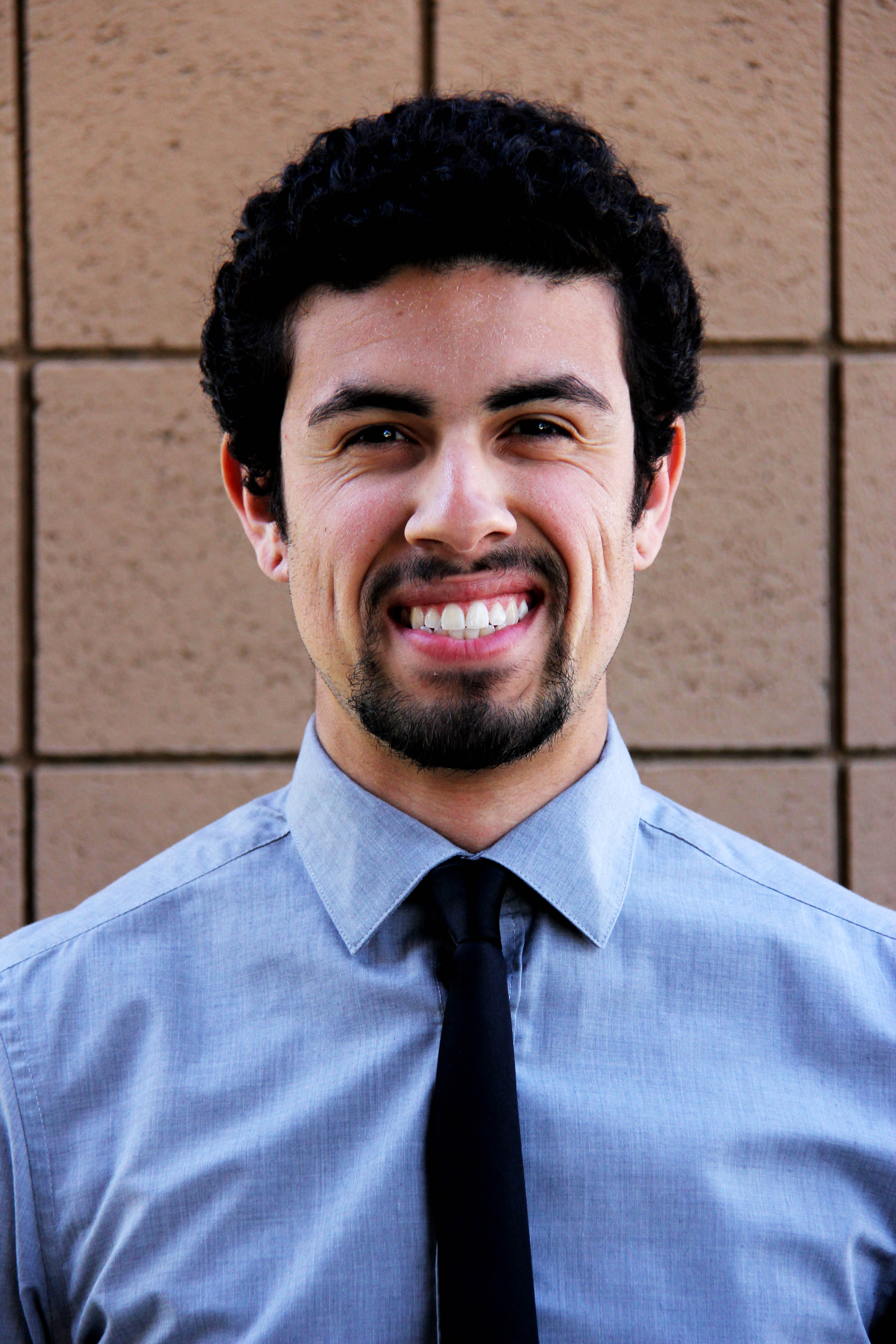
The McNair Scholar will enroll in a dual M.S. in natural resources and environment and M.A. in urban planning at the University of Michigan in the fall, but has always been an advocate for environmental justice issues, even creating an innovative research project on food wastage at CSUDH. He says being an integral member of the university’s anthropology club helped shape him into who he is today.
“Honestly, the folks in the anthropology club have been my main friends at CSUDH,” Jones said. “I found a space where I could be myself with different, yet very like-minded people who are always up for either camping/hiking or grabbing a beer at the Toro Lounge (and everything in between).” The club helped him hone his interests in environmental issues, including practical sustainability.
He hopes to one day have a future career being involved in local or regional planning initiatives that oversee socially just and sustainable development in metropolitan areas–preferably in Los Angeles.
Jones says that while he’s excited to be graduating, he will miss CSUDH.
“I love the atmosphere and diversity of the campus. Each professor and student always have some piece of advice that relates to my life experiences,” he said. “I’m mostly amazed by how much I was able to progress both academically and professionally during my time here.”
Blanca Garcia, 35, B.A., Spanish literature with minor in psychology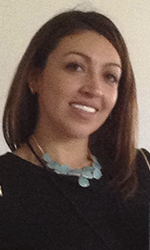
At the age of 17, Blanca Garcia came to the U.S. by herself from her hometown of Jalisco, Mexico to care for her blind grandmother.
Despite being in a new country, new home, and not knowing the language, Garcia persevered, learning English and continuing with her education despite her caretaker duties at home. She went on to receive her high school diploma and became a vocational computer literacy instructor, but says she always wanted to follow her dream of becoming an educator, which led her to attend CSUDH.
“I wanted to become a teacher,” said Garcia. “Even though my parents and entire family were in another country, their love and support, along with my professors at CSUDH provided me with the motivation and self-confidence to continue with my education.” Garcia went on to become a McNair Scholar on campus, and has been accepted into UC Irvine’s Spanish and Portuguese Ph.D program, which she will begin this fall.
She hopes to finish her program and come back to teach other students in the CSU system, as well as give back to her hometown in Mexico.
“I would like to help students from my town by providing them with the necessary resources to complete their educational goals,” she said.
Cesar Deleon, 23, B.S., chemistry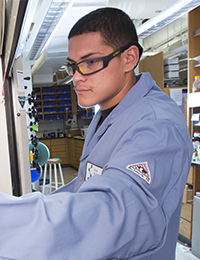
Cesar Deleon came from a family where hardly anyone went to college, and he was headed down the same path–until the birth of his son during his junior year of high school.
“I changed the way I dressed, the way I communicated with people, the people I hung out with, and the idea of my future,” he said. “No longer was I thinking about soccer, girls, and friends. I was instead thinking about college, a professional career, and being the role model I wanted to be for my son.”
That shift propelled him into becoming a stellar student at CSUDH, maintaining a 3.8 GPA his entire four years, being involved in numerous on-and-off campus opportunities, including the Minority Access to Research Careers Undergraduate Student Training in Academic Research program (MARC-USTAR). He’s also been a peer mentor and involved in the Male Success Alliance, a student success organization that aims to provide a support system for young African American and Latino males.
A star research student on campus, Deleon will attend a Ph.D program in chemistry at USC this fall. He was awarded the prestigious Dornsife Doctoral Fellowship, which covers full tuition and guarantees research funding for five years. He has also been offered a summer research position at a USC lab, where he will focus on the development of antiviral drugs. After he completes his education, he would like to teach or become a lead scientist at a pharmaceutical company.
Deleon says that reaching graduation is by far his biggest academic achievement.
“As a first-generation student and young parent from the ‘ghetto,’ I have achieved what so many once told me would be nearly impossible.” he said. “I have managed to graduate with honors, and maintain a happy and healthy family. This is all that matters.”
Jose Lara-Ruiz, 28, B.A., psychology with a minor in biology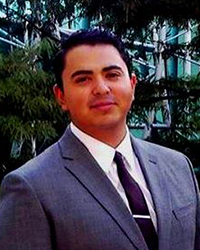
Jose Lara-Ruiz, a motivated psychology student who is also a veteran, has served as the president of the psychology club (2012-2013), president of the CSUDH Psi Chi (The International Honor Society in Psychology) chapter (2013-2014) and been co-chair of the Student Research Day Student Committee in 2014. He says being so heavily involved is what set his school experience apart from many other students’.
“I got the opportunity to meet, interact, network and mentor many students…it only enhanced my experience and solidified my passion to conduct research,” he said.
He was also an MBRS-RISE scholar as well as a member of the George Marsh Applied Cognition Laboratory, where he was able to focus on the more intimate aspects of clinical psychology.
After graduation, he plans to continue his graduate studies at CSU Northridge in the clinical psychology program to further conduct research on post-traumatic stress disorder (PTSD) and its subsequent cognitive deficits.
“I want to contribute to the development of treatments to alleviate the struggle of my fellow veterans and individuals affected by traumatic stress,” he said.
Mario Castillo, 28, B.A., anthropology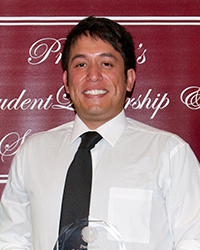
Mario Castillo, a first-generation immigrant from Mexico, won the Presidential Outstanding Student Award this year and was handpicked for the Ford Foundation Predoctoral fellowship at UC Berkeley in the fall.
The McNair Scholar will attend the Bay Area school as the first undergraduate from CSUDH to win the prestigious fellowship and plans to direct major archaeological projects in Mexico and North America some day.
This summer, he will travel to Chiapas, Mexico, to assist with ethnographic interviews and surveys as a part of the Soconusco Ethnoecology Project which is directed by Dr. Janine Gasco of the CSUDH Anthropology Department. Afterward, he will be a Spatial Archaeometry Research Collaborations (SPARC) resident at the Center for Advanced Spatial Technologies at the University of Arkansas, where he will help with the Corona Atlas Project. It is an innovative project that uses declassified CIA satellite images to inventory archaeological sites in the Middle East.
Castillo says that while graduating from CSUDH is an incredible honor, his success has had a positive effect on his family as well: “I’m proud that my work has inspired my younger sister to attend college too,” he said. “I’m incredibly proud to be a Toro.”